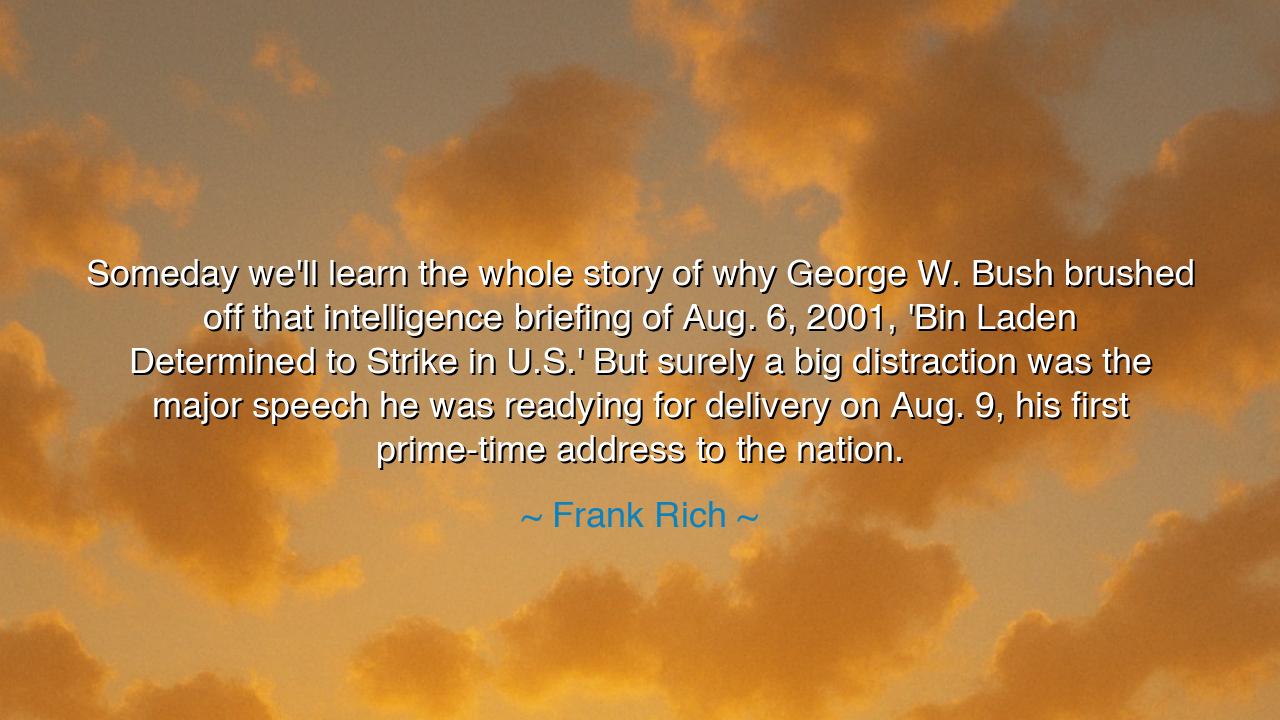
Someday we'll learn the whole story of why George W. Bush brushed
Someday we'll learn the whole story of why George W. Bush brushed off that intelligence briefing of Aug. 6, 2001, 'Bin Laden Determined to Strike in U.S.' But surely a big distraction was the major speech he was readying for delivery on Aug. 9, his first prime-time address to the nation.






“Someday we’ll learn the whole story of why George W. Bush brushed off that intelligence briefing of Aug. 6, 2001, ‘Bin Laden Determined to Strike in U.S.’ But surely a big distraction was the major speech he was readying for delivery on Aug. 9, his first prime-time address to the nation.” Thus spoke Frank Rich, the chronicler of power and conscience, whose words cut through the fabric of politics to expose the fragile heart of human error. His statement is not merely an indictment of one man or moment, but a lamentation upon the eternal weakness of leadership—the failure to heed the warning before the storm, the blindness that comes when pride and performance eclipse vigilance and truth.
Rich speaks of a time etched into the memory of nations—the days before the September 11 attacks, when the world still believed in its own stability. The intelligence briefing he recalls was not a whisper in the wind; it was a warning clear as thunder, declaring that danger was near, that a strike upon the homeland was not a distant speculation but an impending reality. Yet, as Rich notes, it was brushed aside, buried beneath the demands of politics, the crafting of speeches, the theater of governance. In this single act of neglect, we see the tragic pattern that has repeated through the ages: the voice of caution silenced by the noise of ambition.
This is not the first time a ruler has ignored the signs that destiny placed before him. The annals of history are filled with such blindness. Consider Emperor Nero, who, in the final days before the fall of Rome’s peace, devoted his energy to song and spectacle while the fires of rebellion gathered at the empire’s edges. Or think of Troy, whose elders dismissed Cassandra’s prophecy, mocking her as mad while the horse stood within their gates. So too did Bush’s administration, perhaps unknowingly, repeat the ancient folly—believing themselves secure, they mistook forewarning for fantasy. The cost, as in all such tales, was paid in blood and sorrow.
The deeper meaning of Rich’s quote lies not only in the event itself, but in the timeless lesson it carries: attention is the first duty of power. To govern, to lead, to protect—these require not eloquence, but awareness. The leader who gazes too long at the mirror of public approval forgets to look out the window at the gathering storm. And when the tempest comes, it is not only his house that falls, but the homes of thousands. The sin of neglect is subtle, but it is as deadly as betrayal. In failing to listen, one betrays the very people whose trust has been given.
Yet there is compassion even in the rebuke. Rich’s words remind us that distraction is a human weakness, not confined to presidents and kings. Each of us has brushed aside our own inner warnings—the quiet voice that says “prepare,” the intuition that urges “listen.” Whether in families, in work, or in the care of our own souls, the pattern is the same: we are tempted to prize appearance over substance, performance over truth. The lesson, therefore, is not to condemn alone, but to awaken—to remember that foresight is a sacred gift easily lost in the noise of the world.
Consider the example of Abraham Lincoln, whose greatness was not in his speeches, though they endure, but in his patience to listen—to his generals, to his enemies, and even to his own doubts. Before each great decision, he wrestled not with the desire for glory, but with the weight of consequence. He understood that wisdom demands stillness, that leadership requires humility before the unknown. It was this quiet vigilance, not pride, that preserved the Union. In Lincoln we see the antidote to Bush’s failure: the courage to heed warning, the humility to pause before speaking.
Therefore, let the saying of Frank Rich be taken as a warning to all ages. Whether one leads a nation, a company, or a single household, never dismiss the message that comes quietly, for it may be the voice that saves. In every life there are briefings—moments of insight, dreams, intuitions—that reveal the unseen dangers ahead. Do not brush them aside in pursuit of your own “speech,” your own ambition, or the applause of others. Stop. Listen. Reflect. For as history has shown again and again, the greatest tragedies are not born from ignorance, but from the failure to listen when truth knocks at the door.






AAdministratorAdministrator
Welcome, honored guests. Please leave a comment, we will respond soon